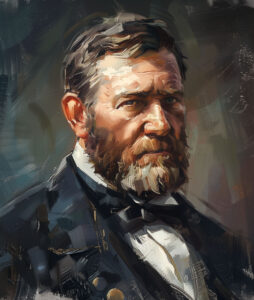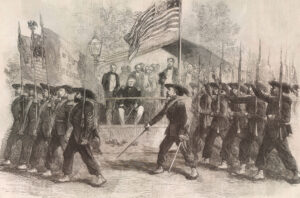LINCOLN’S LETTERS: THE PRIVATE MAN AND THE WARRIOR
Most presidents’ written records have been pored over by scholars in minute detail. These scholars, in turn, produce volumes of their own, intended to tell us what our leaders’ writings really meant.
Abraham Lincoln’s writings need no such interpretation. Love him or hate him, few can deny that Lincoln had a wonderful gift of using plain language and phraseology that, coupled with his natural wit, make his writings a joy to read–or, in this case, to listen to.
In a two-cassette volume, Commuter’s Library has gathered a selection of Lincoln’s letters ranging from 1838 to 1865. These encompass letters from his early years as a young man just beginning his career in public service and extend to a communiqu? he sent to General U.S. Grant less than a week before his untimely death from an assassin’s bullet.
George Vail, the narrator, was an admirable choice. His slight Midwestern twang and down-home speech are a joy to hear, and help bring life to Lincoln’s words. His voice is admittedly deeper than Lincoln’s reportedly was, but is probably more pleasant for it.
At under three hours, the narrative makes for a pleasant listening experience on short daytrips. Some might argue that a larger and longer selection would have been better, but, as Mark Twain informed audiences when he paused for an intermission, listening is hard work. A longer selection would run the risk of boring the listener, and would also mean a higher price tag.
The recording quality of the tapes, which were digitally mastered to reduce annoying background hiss and noise, is to be commended. One hears none of the background conversations that are sometimes picked up on other similar recordings.
Though the cassettes are attractively packaged, the front cover would last longer if it was made of sturdy plastic or, at the very least, the cardboard cover was laminated. The current cardboard cover would not hold up well after a few weeks on the road. The comment card enclosed in the package was a pleasant surprise. It not only asks for an assessment of the product but also solicits suggestions for future materials.
While the brief chronology of Lincoln’s life included on the inside cover is a nice touch, the lack of a narrative to identify what period of Lincoln’s life each letter encompasses is somewhat disconcerting. The simple inclusion of a brief introduction such as “The following letters were written while Lincoln served in the Illinois House of Representatives” not only would be informative but also would prevent listeners from trying to read the cover to find the information while hurtling down the highway.
Some indication as to when a side of the tape is beginning and ending would also be helpful. The narrative begins with no introduction, but rather an autobiographical letter, leading the listener to question momentarily whether he started at the beginning or somewhere in the middle. Adding “End of side A” would also be appreciated.
The reading of the letters appears to be accurate, with one minor slip. In a letter to Maj. Gen. George McClellan in 1862, the address was given as Yorktown, Pa., not Yorktown, Va. Whether this was a typo in the copy being read or a mistake by the narrator is unclear.
One selection was somewhat questionable. The inclusion of a note inviting Charles Sumner to Lincoln’s second inaugural ball seemed out of place.
Overall, though, these minor problems don’t detract from the listener’s enjoyment of the tapes. They are a worthwhile listen, perfect for a short trip–perhaps to a Civil War battle site. I would recommend the set to any Civil War enthusiast, and look forward to future offerings from Commuter’s Library. Keith Toney
No stage or screenplay could bring Abraham Lincoln to life quite like his own written words–now interpreted on audio cassette.
Produced by Commuter’s Library, P.O. Box 3168, Falls Church, VA 22043, two audio cassettes, $16.95.
Keith Toney




